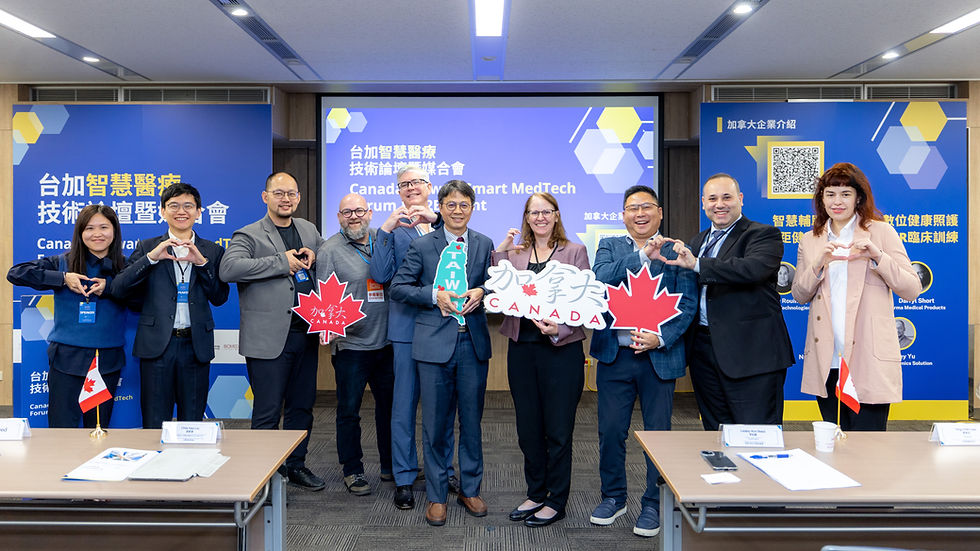Connect to "Asia's Silicon Valley"
- IP² Launchpad Manager

- 2022年2月17日
- 讀畢需時 4 分鐘
已更新:2022年4月18日
The Gate to the Far East

Taiwan's government will invest about $1 billion by 2023 to cement its status as "Asia's Silicon Valley." The program for promoting an innovation ecosystem was presented by Taiwan's National Development Council in 2018. The program includes five strategies for developing and establishing an ecosystem for start-ups and technological innovation - allocating funding to early-stage start-ups, tax incentives for angels and collaborations with venture capital funds, adjusting regulation and promoting the development of talent. In addition, the program promotes cooperation between industry and government, including encouraging government procurement and opening government programs that support start-ups, as well as opening up the domestic capital market and promoting exposure in global markets through various services dedicated to start-ups. In order to encourage innovation, the current administration in Taiwan operates a "5+2" program and invests considerable resources in sectors that will encourage the development of innovative industry, including the Internet of Things, life sciences, green energy, robotics and homeland protection. Subsequently, innovation in agriculture and a cyclical economy was added.
Taiwan has made headlines in the past two years for its success in dealing with the coronavirus. While most countries in the world closed with the outbreak of the coronavirus pandemic, the economy in Taiwan continued to operate normally and the Taiwanese economy showed positive growth, with growth momentum presented by the Taiwanese economy in 2021 expected to continue this year. Last month, Taiwan's National Development Council revised its 2022 growth target to 4.6 percent, higher than the target set in November 2021, at 4.15 percent. The expectation of continued growth is based on growth in domestic investment, strong exports and continued growth of private consumption. At the same time, the global chip crisis has illuminated the global dependence on Taiwanese chip maker TSMC, which was established in the 1980s with the aim of building a high-tech industry and technology that currently produces over 50 percent of the world's chips.
Israeli-Taiwanese connection
Trade relations between Israel and Taiwan, which according to data from the Ministry of Economy and Industry, the Foreign Trade Administration, amounted to about $1.7 billion in 2020, representing a moderate increase over the past five years. In October last year, Israel hosted the 13th Mixed Economic Committee of Israel and Taiwan, which was held online due to covid restrictions. Following the committee, agreements were reached for cooperation in a variety of fields, from water technologies to renewable energy. In addition, as part of encouraging innovation in the Taiwan ecosystem over the past two years, Taiwan's Ministry of Economy has begun to operate a number of innovation programs to promote technological ties and cooperation between Taiwan and Israel. The plans accelerate the entry of companies into operations in Taiwan's "Silicon Valley" and operate in the Startup Terrace Innovation Center, which is supported by the Taiwan Ministry of Economy's Small and Medium Companies Administration, which serves as a local activity center for them.
The Taiwan administration's strong push to promote an ecosystem of innovation, investment, economic growth, and ties between Israel and Taiwan opens up an opportunity for Israeli companies to take part in Taiwan's global growth and lead Asian "Silicon Valley." In the past two years , Taiwan's Ministry of Economy has been operating a number of programs to promote ties and cooperation between the Israel and Taiwan ecosystems, with the aim of encouraging the entry and activity of Israeli high-tech companies to Taiwan and from there to expand to the rest of Asia.
Taiwan and Israel share quite a few similarities– both small in size, with a progressive and developed economy, a democratic regime based on a capitalist economy, and dealing with challenges such as a lack of natural resources and a complex historical relationship with neighbors. In addition, Taiwan and Israel have a long and present tradition and history. In both cultures you can find values from tradition that are still expressed today, in the 21st century, and exist hand in hand with progress, modernity and technological developments.
Alongside the Taiwanese's many similarities and appreciation for "Israeli audacity", boldness and innovation, it is also important to understand cultural differences, to emphasize commitment, reciprocity and trust, and to come with a lot of flexibility, perseverance and patience. As the Business Parties, The Israeli and Taiwanese, strengthen and establish the personal relationships, the success of the parties in joint construction of Taiwanese Silicon Valley will accelerate.
Building ties, "Guanxi" 關係, is an art in itself. Negotiating, signing agreements. Through a local partner, Israeli companies will accelerate their entry into a hugely growing market, brimming with investments and focused on establishing it as the hub for global activity and East Asian markets.
Writers:
Rani Shifron, CEO of The Healthier Globe, Director of The IP2 Innovation Programs in Israel
Meital Margolis Lin CEO and Founder Of Taiwanit
Innovation To Industry - i2i
i2i, established from Taiwan's largest IT research institute, since 2000i2i manages Taiwan's largest incubators - the Nan-Kang software incubator and the Kao-Hsiung software incubator.
i2i has established and manages a technological ecosystem that supports and connects Taiwan innovation stakeholders and operates the IP² LaunchPad program, a program that accelerates the entry of Israeli startups into the Far East markets and to activities in Taiwan's ecosystem. ) in Taiwan. Rani Shifron, CEO of the Israeli consulting firm Healthier Globe, representative of i2i and director of the program in Israel. The second cycle of the program includes companies that are in advanced stages, after an initial round of recruitment and with initial sales, as well as digital transformation in the fields of healthcare, high-tech and renewable energy based on Big Data, AI, IoT, 5G, and Cyber Security.




留言